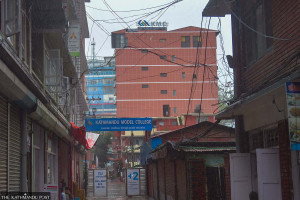Entertainment
One common goal: Peace and Prosperity
The Peace Boat Special Global University Programme changed my perspective
Nishchhal Kharal
I recently participated in the Peace Boat Special Global University Programme 2015. The programme provided me with a different
perspective in fighting poverty. It was a 22-day intensive education programme for future global leaders with the theme Human Security and National Security.
The most amazing thing about this programme was its unique curriculum, where 15 participants with diverse backgrounds visited four different cities in Asia and critically analysed their problems and the causes, its effects and possible solutions through workshops, seminars, debate, discussion and planning. This programme not only gave me insight on issues such as poverty, power and peace but also gave me an opportunity to experience life from different lenses—understanding the local realities of each city. Most importantly, those 22 days made me realise that life is all about learning, experiencing, growing and at the same time contributing to the society as much as you can.
The first destination of my trip was Tokyo, Japan. People in Japan are very busy and hard-working. There I visited Sanya, a settlement area for the homeless. I was surprised at first to see people living in such pitiable conditions in such a developed country.
But once I got interacting with them I found that the cause of the problem was entirely different from what I’d imagined. Most of the homeless people were migrants from countries neighbouring Japan. They were the people who came to Tokyo to work in construction sites and were rendered homeless.
Then I visited Cebu, one of the business hubs of Philippines. I along with other participants met the mayor of Daanbantayan Municipality and learned about the rehabilitation and recovery strategy of the government to support people affected by typhoon Haiyan. I was amazed to see the way the community was bonding after the typhoon, while my people are fighting with each other to receive aid in Nepal. People of Daanbantayan are working towards rehabilitation and focusing on being prepared for future natural disasters.
Then we visited Singapore. Singapore has been praised for its multiculturalism and religious tolerance. That has helped its significant economic growth. Singapore has a lot of migrant workers coming in from developing countries like Bangladesh, Philippines, India etc. We visited Transient Workers Count Too (TWC2), an organisation through which I found that migrant workers were not allowed to conduct public demonstration and strikes. The employer’s right to cancel a worker’s work permit makes migrant workers accept all kind of abuse and human rights violation. While I was in Singapore, I also
participated in a symposium on ‘Global Mobilization and Social Cohesion’ at Lee Kuan Yew School of Public Policy, National University of Singapore and discussed similar issues of local and global context.
Mumbai is largely known as the city of Bollywood, but after being back from Mumbai, I can say it is a city of disparity between the poor and the rich. Mumbai has one of the largest slums in Asia. I visited local houses and interacted with the local residents about their difficulties and challenges. Everyone was fighting with poverty. When interacting with Bhau Korde—a social activist of Dharavi, one of the largest slum of India—I found out how political leaders use the people in slums during the election and forget about them when they are in power.
After participating in this programme, participants like me did not just learn, enjoy and experiencethe diversity and different issues of the countries but also contributed, in a small way, towards a better future for some individuals.Two issues: Migrants rights and Preparedness to Disaster got important places in the discussions we had among participants.
The 22 days changed my perspective to look at challenges. It made me see that the only way we can eradicate a problem is by locating the main cause.
Kharal is currently pursuing his Master’s degree in Conflict, Peace and Development Studies at Tribhuvan University




 20.36°C Kathmandu
20.36°C Kathmandu












